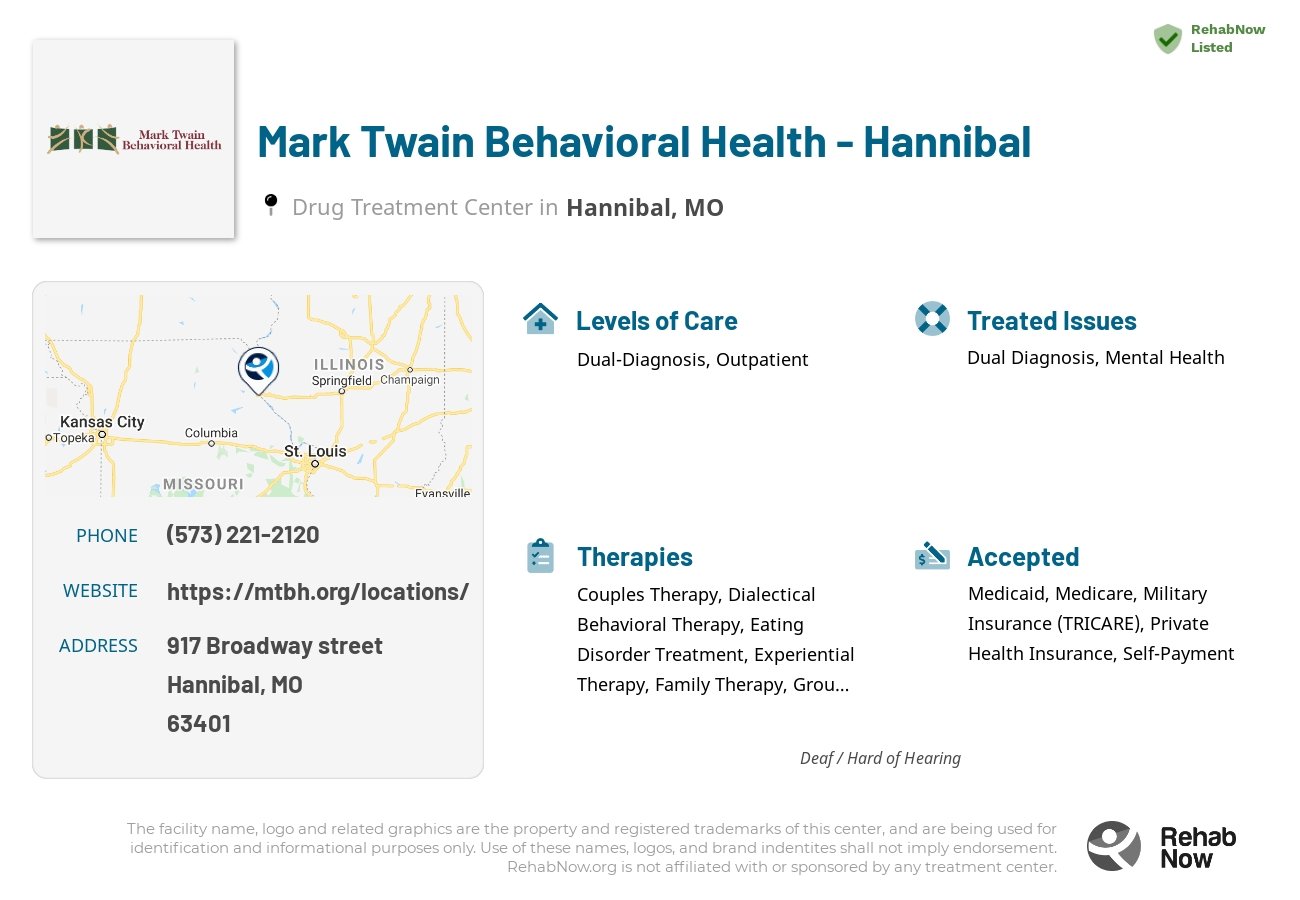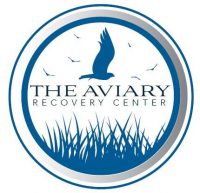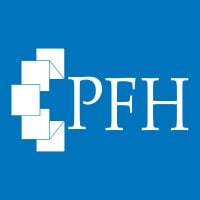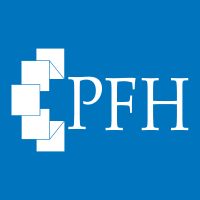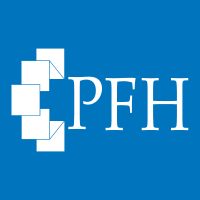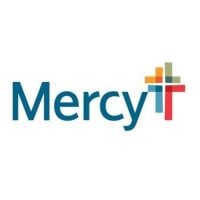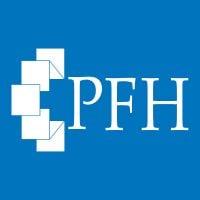Mark Twain Behavioral Health - Hannibal
Drug Rehab Center in Hannibal, Missouri
Mark Twain Behavioral Health - Hannibal in Hannibal, Missouri is an addiction treatment facility offering comprehensive care, including outpatient, detox, dual diagnosis, and aftercare support programs, with a focus on evidence-based approaches and personalized treatment.
About Mark Twain Behavioral Health - Hannibal in Missouri
Mark Twain Behavioral Health - Hannibal is an addiction treatment facility located in Hannibal, Missouri, which provides a range of services for individuals suffering from a wide range of drug and alcohol addictions. Founded in 1975, the facility is committed to providing comprehensive, high-quality care for individuals struggling with substance abuse, mental health, and dual diagnosis disorders. In addition to offering outpatient, detox, dual diagnosis, and aftercare support programs, Mark Twain Behavioral Health - Hannibal also offers partial-hospitalization levels of care for those in need of more intensive care. Their staff of experienced professionals is equipped to provide tailored support and treatment for patients seeking recovery.
Mark Twain Behavioral Health - Hannibal emphasizes evidence-based approaches for treating addiction and substance abuse, utilizing many different approaches such as cognitive-behavioral therapy, motivational interviewing, 12-step facilitation, and more. To ensure their commitment to providing excellent care, Mark Twain Behavioral Health - Hannibal is accredited by CARF, and holds state licensures and accreditations to ensure that their programs are of the highest quality. In addition, they accept private health insurance, making their services more accessible to those seeking addiction treatment.
Genders
Ages
Modality
Additional
Accreditations

CARF
The Commission on Accreditation of Rehabilitation Facilities (CARF) is a non-profit organization that specifically accredits rehab organizations. Founded in 1966, CARF's, mission is to help service providers like rehab facilities maintain high standards of care.
Conditions and Issues Treated
Individuals who are addicted to drugs and/or alcohol often have one or more co-occurring mental health disorders. Addressing both the addiction and the mental health problems at facilities like Mark Twain Behavioral Health - Hannibal can be very beneficial for these individuals.
Common mental health conditions that often co-occur with addiction include:
- Anxiety Disorders – People with drug and alcohol problems often suffer from anxiety disorders such as panic disorder, obsessive-compulsive disorder, social anxiety disorder, and generalized anxiety disorder.
- Depression – One of the most common mental illnesses co-occurring with addiction is major depressive disorder.
- Attention-deficit hyperactivity disorder (ADHD) – Many people with drug and alcohol problems also suffer from ADHD.
- Bipolar Disorder – People with bipolar disorder are more likely to suffer from drug and alcohol problems than the general population, and vice versa.
Levels of Care Offered
This center offers a variety of custom treatment tailored to individual recovery. Currently available are Dual-Diagnosis, Outpatient, with additional therapies available as listed below.
Outpatient treatment can be considered the lowest intensity level of addiction treatment in Hannibal, MO. It is ideal for early phase addiction or lower intensity addictions. Mark Twain Behavioral Health - Hannibal peer group support, 12-step programs, and individual counseling are likely to be involved.
Therapies & Programs
Individual therapy is ideal for addicts who want to focus on themselves. It can also be helpful for those whose withdrawal symptoms are exacerbated by the presence of other people.
Benefits of individual therapy are:
- Access to a personalized treatment plan that focuses on the individual needs of the addict
- More privacy during treatment sessions
- Better personal development through introspection
- Increased self-awareness regarding addictive tendencies in order to avoid relapse
- Greater potential for a long-term recovery plan
- Receiving professional advice and detox assistance from medical staff
Couples therapy is a treatment method used to help couples in which at least one member of the couple has a drug addiction. Couples therapy can be used whether the addicted partner is using drugs or in recovery. An additional benefit of couples therapy is that it can help make other types of treatment, such as 12-step programs, more effective.
Family therapy can help you and your family deal with old issues that may trigger substance abuse. The idea behind family therapy for drug addiction is that you are never fully healed from substance abuse until you’ve healed your relationship with your family, too. To get sober, you need to find a different way to cope with the pain in your life.
This is when a group of people in various stages of recovery meet up and discuss their experiences, triggers, successes, failures, and even alternative therapies! Unlike support groups where everyone already knows each other, group therapy is conducted along side outpatient or inpatient treatment at Mark Twain Behavioral Health - Hannibal.
Trauma therapy is a clinical process that helps individuals deal with mental stress often caused by traumatic events. The therapist helps the person identify, understand and work through the problem. This is done with the help of talking about it in group or one-on-one counseling sessions.
Therapists use relaxation, role-playing, art, and music to help the person open up about what is bothering them. Some examples include:
- Talking about the traumatic event and how it affected them.
- Helping those who have PTSD to deal with their nightmares and recurring memories.
- Working with individuals to resolve the issues triggering the stress, whether seeing someone who reminds them of what happened or feeling helpless.
The individual is also encouraged to help others that are struggling with similar problems. This often helps them feel empowered and gives them hope.
Trauma therapy is not for everyone; it is usually reserved for people who have recently experienced a traumatic event and struggle to get over it. It is generally done for children, teenage victims of sexual assault, and war veterans.
Dialectical Behavior Therapy (DBT) is used by drug treatment centers across the United States to help drug addicts become sober. DBT is a type of Cognitive Behavioral Therapy (CBT) that combines traditional behavioral treatments with elements from DBT, including dialectics, distress tolerance, and interlocking issues. Some of the negative behaviors associated with addiction, such as impulsivity and mood swings, are addressed in DBT, while others like craving and isolation are not. It is commonly used to treat Borderline Personality Disorder (BPD) along with substance abuse disorders.
The four DBT modules are mindfulness, interpersonal effectiveness, emotion regulation, and distress tolerance:
- Mindfulness helps recovering addicts learn to identify and experience their emotions while realizing that they are not permanent.
- Interpersonal Effectiveness includes assertiveness, asking for what you need, and saying no while improving communication skills.
- Distress Tolerance has recovering addicts learn how to tolerate distress at the moment and avoid resorting to substance abuse.
- Emotion Regulation is used to identify, express and change emotions.
CBT is a psychotherapy approach and method. [ws-nap-name] people to examine how their thoughts, including habitual harmful and inaccurate thinking, affect their actions. CBT is based on the idea that rigid, inflexible thinking leads to poor stress management, which leads to emotional distress.
Similarly, CBT helps people identify and change negative behaviors. It makes you question your perceptions and ask if they are realistic. CBT asks people to examine their behaviors and emotional responses and how they affect their lives. CBT aims to change people’s thinking and behavior to lead a more balanced and healthy life.
Moreover, CBT has been shown to reduce anxiety disorders, depression, and symptoms associated with harmful thoughts or actions.
Nutrition therapy has been used to help drug addicts for decades. Many early reports on addiction treatment indicate that some patients recovered from the “satisfying power of food”. For years, this phenomenon has been utilized as a treatment modality in eating disorders for adults, adolescents, and children. Specific nutrients have been identified that influence neurotransmitters associated with reward pathways of the brain.
Studies have shown that carbohydrate loading with complex carbohydrates to elevate serotonin levels was effective in treating bulimia nervosa. This approach prompted researchers to explore the use of this type of nutritional intervention in other disorders.
Nicotine replacement therapy is a drug treatment that allows people to get the effects of nicotine without chewing or smoking. The therapy is often done with a patch, and doses of nicotine are reduced until nicotine is no longer needed. NRT helps smokers get nicotine into their system without resorting to smoking, and it has been shown to be an effective way to help people quit smoking. Coupling NRT with counseling and other means of support gives long-term smokers a better chance of removing their unhealthy habit.
Patient Experience
Experiential Therapy at Mark Twain Behavioral Health - Hannibal
Experiential Therapy is a type of therapy that involves activity to recreate situations that may have caused trauma or negative emotions. Experiential therapy at Mark Twain Behavioral Health - Hannibal in Hannibal, MO can involve acting, props, arts and crafts, animal care or other tools that may be effective. This therapy is done on an individual basis and can help revisit and heal from past traumas. Trust between the therapist and individual is important for success. Experiential therapy can help you more closely become you and move through life positively and authentically.
Payment Options Accepted
For specific insurance or payment methods please contact us.
Is your insurance accepted?
Ask an expert, call (888) 674-0062
Mark Twain Behavioral Health Associated Centers
Discover treatment facilities under the same provider.
Learn More About Mark Twain Behavioral Health Centers
Additional Details
Specifics, location, and helpful extra information.
Hannibal, Missouri 63401 Phone Number(573) 221-2120 Meta DetailsUpdated November 25, 2023
Staff Verified
Mark Twain Behavioral Health - Hannibal Patient Reviews
There are no reviews yet. Be the first one to write one.
Hannibal, Missouri Addiction Information
Opioid-related overdoses in Missouri have been increasing steadily for the past three decades. In 2018, more than 1,130 people in Missouri died from opioid abuse. Methamphetamines and marijuana abuse have surpassed opioid abuse in Missouri. Missouri is the number 1 methamphetamine manufacturer in the country with more than 27 meth labs per 100,000 people.
9% of Hannibal, MO, residents admitted to using illicit drugs in the past month, and 14 percent admitted to binge drinking. 18% of adults in Hannibal have had an addiction to drugs or alcohol at some point in their life. About 1 in 10 people enrolled in Medicaid in Hannibal also had a substance abuse disorder. Drug treatment options available in Hannibal include inpatient rehab and detox programs.
Treatment in Nearby Cities
- Waynesville, MO (137.5 mi.)
- Aurora, MO (228.2 mi.)
- Sunrise Beach, MO (130.5 mi.)
- Nevada, MO (206.6 mi.)
- Sainte Genevieve, MO (138.9 mi.)
Centers near Mark Twain Behavioral Health - Hannibal
The facility name, logo and brand are the property and registered trademarks of Mark Twain Behavioral Health - Hannibal, and are being used for identification and informational purposes only. Use of these names, logos and brands shall not imply endorsement. RehabNow.org is not affiliated with or sponsored by Mark Twain Behavioral Health - Hannibal.



